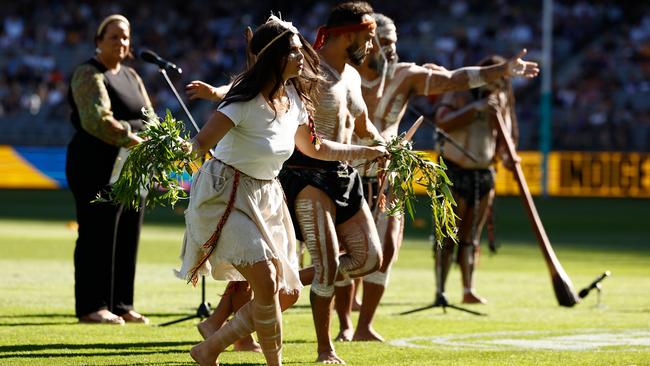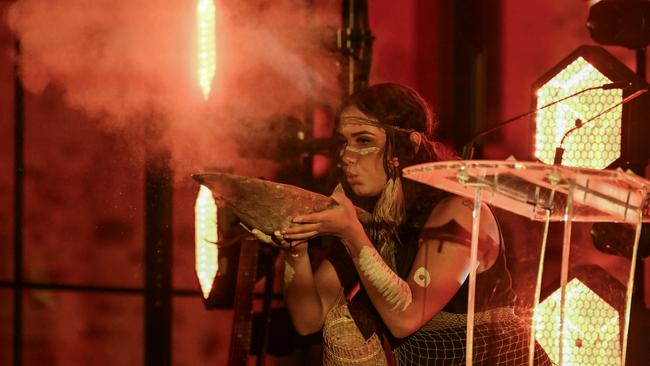Welcome to country attacks point to a deeper malaise

If ever we needed an example of how awkwardly Australia’s First Nations heritage sits within our broader national identity, the final election debate certainly provided it.
The overriding headlines were not about how do we close the disparity of life outcomes between Aboriginal Australians and non-Aboriginal Australians or resolve our shameful levels of incarceration of our First Nations people. Rather, it was a dispute about how we recognise our history, at its most basic and gentle level, that the land on which we have built an extraordinarily successful, progressive, diverse nation still has a disputed history.
While many attacked the referendum on a voice as merely “symbolic”, here is a stark example of why symbols matter, because they reflect how we, as a nation, see ourselves and want to be seen. I, for one, saw the opportunity of the voice as primarily challenging the policy dominance of bureaucrats over the lives of Aboriginal Australians – a dominance that has failed First Nations Australians. But clearly, our nation is still extraordinarily uncomfortable with the fact that we have a First Nations history, and that that history is not one of gentle treaty-making, but one of conquest and stolen lands, and therefore it can challenge the very foundations of our nation’s extraordinary success.
Some Australians wrongly see the welcome to country as an attack on the successful nation we have created, and not only do we see this play out at the most senior levels of our elected representatives but now with the bizarre protests of neo-Nazis at an Anzac Day service. While I will leave the absurdity of a neo-Nazi at an Anzac service to one side, why is it that some of our elected representatives now see political opportunity in a strong repudiation of the First Nations place in our national identity?
Perhaps, on one level, the failure of the voice referendum has given some sort of implied permission for those who are clearly racist to express racist views. But it is deeper than that. I now have regular conversations with friends, colleagues and those who share a different political philosophy on the place of a welcome to country. And yes, I agree, sometimes they can go too long and become too much of a political diatribe, but we are arguing over the symptom, not the cause.

The fact is our First Nations history still edges around the mainstream of our national thinking. First Nations people want to bring this narrative into the mainstream embrace of our national identity. Note, this is not a challenge to sovereignty of our nation; such movements are doomed to divide and fail. Rather, it is for Australians to understand that across the relatively short history of colonial Australia there has been a dramatic impact on the lives of Aboriginal Australians and that impact is relevant today.
The welcome is a device to reconcile this historical reality with modern Australia. It does not seek to blame Australians for the plight of First Nations Australia; rather, it is to seek a patience with the requests Aboriginal Australians make of our country. It is striking that Anzac services have become a flashpoint for this discussion when, at the same service, participants also celebrate the New Zealand national anthem, sung first in the Maori language. New Zealand is way more comfortable in its First Nations skin than Australia.
Without being melodramatic, I find the recent hostility to something as generous and non-threatening as a welcome to country as more profound, and that is a sense of anxiety about Australia’s place in the world. We are coming off a period of amazing wealth creation. China has dramatically expanded our global terms of trade and that has seen wealth beyond imagination created. Yet, in the 10 years to 2022 the number of university students studying an Asian language fell 30 per cent.

Despite the source of our wealth, we seem less engaged, less confident, less understanding of the region that matters most to us – Asia. As a nation we have turned on our international students without the corresponding thinking on how this industry benefits us, not just in Australian jobs, but in our soft power.
The welcome to country, once well-established, has morphed into a challenge to some Australians’ sense of their own place in our nation. Rather than see it as a simple acknowledgment that Australia, before colonial settlement, had a diverse First Nations heritage, it is wrongly seen by some as an attempt to disrupt or diminish the multicultural nation we have created. Aboriginal Australians see it as an opportunity for every Australian to accept our history, yet we now face the prospect of abuse and, inevitably, anxious event organisers who see cancelling a welcome as the less controversial approach.
The reality is our First Nations history need not be contentious. A welcome is not something that challenges the nation we have created nor the diverse populations within it. Rather, it is a chance, briefly, to reflect with pride on the long history that now gifts us mineral wealth, tourism delight and continental security, something every Australian can celebrate.
The Australia we have created is amazing – vibrant, successful, reliable; we can be proud of each part of our history, including our British parliamentary democratic heritage. However, the one unique part we have, that stands us out from all other nations, is our First Nations history. Ancient and robust, a history we can all own and celebrate, and take with confidence into a world more volatile than ever. If we cannot resolve our own internal history, with a place for our First Nations people, how will we face the challenges in our region, where we still stand, to many of our trading partners, as something of an odd European outpost? A welcome to country is simply that, an expression of our Australian history, for every Australian.
Ben Wyatt is a former West Australian treasurer and a director of Rio Tinto and Woodside.



